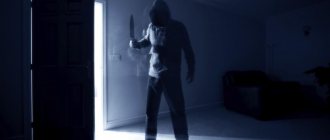Theories about the nature of sleep
There are 3 theories about the nature of sleep. Each of them has supporters and opponents:
- In a dream, the soul is separated from the body. She travels through subtle worlds and is able to meet other souls and deceased relatives. A spiritually prepared person is able to control himself while traveling—a similar experience is shared by people who engage in astral travel. An unprepared person is not able to perceive the subtle world, so his wanderings remain in memory as a mixture of memories, sometimes crossing all boundaries of the reasonable.
- Rest is needed to “reboot” the brain. All the impressions of the day are sorted out, and sometimes old memories flash through. A person often sees himself in everyday or unusual situations. This theory has a fragile basis, since scientists have concluded that the brain does not get tired. Sleep is needed for psychological relaxation, and the thought process is never interrupted.
- A theory that combines both options. It says that first the brain gets rid of the information accumulated during the day. Then, forgetting about earthly problems, the soul goes on a journey through the universe.
Some people deny the existence of the soul and the possibility of out-of-body travel.
Psychologists believe that dreams are a projection of experiences, feelings and dreams .
Religious teachings claim that in dreams people not only travel, but also see fragments of memories from past lives.
Attempts to study the origin of dreams and their influence on people have been made for centuries. In Ancient Egypt, they believed that sleep was the source of divine revelations, so the chosen ones were allowed to sleep on consecrated beds to receive the wisdom of the gods. And people who had vivid dreams were generally considered almost prophets and their dreams were written down on papyrus. Many years have passed since then, scientists, of course, abandoned such theories, but sleep is still one of the main mysteries of humanity, although some interesting facts about sleep are already known.
What is known about dreams
Dreams come to us during the REM sleep phase, which occurs approximately 90 minutes after falling asleep; it is at this time that the brain is in its most active state. By the way, sometimes this phase of sleep may be absent for various reasons, so we spend the night without entertaining dreams. It is also known that in one night we can see from 3 to 6 dreams, lasting from 5 to 20 minutes each, but we usually remember the one we dreamed about last.
Experts define sleep as a thought process, which in most cases is some continuation of the events that happened to a person during the day; it’s just that all emotions and events appear in the form of metaphors and symbols that require interpretation.
During sleep, the brain works differently than when awake - some areas begin to work more actively, while others stop their activity altogether. For example, the prefrontal cortex, which is responsible for rational thinking, is completely disconnected from the work process, but the amygdala, which controls emotions, enters a phase of increased activity. That is why, seeing flying cows and a talking tree in a dream, for example, we perceive this as a completely natural event.
Oddly enough, in our sleep we continue to think about our problems, achievements, failures, and plans for the future. And while being in an unconscious state, we are focused as strongly as possible on the issues that concern us. Therefore, it is quite possible that the answers to them can also come to us in this state.
Are dreams prophetic?
There are heated debates on this topic even among experts, and as in any issue there are always at least two sides. Proponents of the rational approach firmly believe that in dreams a person’s experience is manifested in the form of symbols, but the other half believes that dreams can be harbingers of future events, and there is historical evidence for this.
Abraham Lincoln, three days before his assassination, had a dream in which he attended his own funeral and saw his own closed body, which he woke up and told his wife and several friends about. Carl Jung kept records of his terrifying dreams of a "dead" Europe some time before the First World War. Why, probably every person at least once in his life witnessed how dreams came true after some time. Of course, until the moment of this incarnation it is impossible to determine whether the dream was prophetic, hence all the ensuing difficulties in interpretation.
Sigmund Freud wrote in his works that sleep is nothing more than repressed and unconsciously suppressed conflicts and desires, which often last from childhood. There are many opinions, but be that as it may, in any case, it is clear that dreams do not just happen, it is through them that our subconscious communicates with us, which we do not always hear while awake.
Working with dreams
If you are really interested in learning how to interpret dreams, experts recommend keeping a special diary in which you will record dreams, as well as events and experiences that happened during the day and conduct further analysis. It will take just a little time before you begin to identify patterns between night images and waking events. For example, after a strong disappointment experienced during the day, at night you may find yourself in the midst of a plane crash, and after a terrible bear attack in a dream, an unexpected relative will suddenly come to visit you in the morning...
You can also try to understand dreams logically. For example, if in a dream you see yourself as a small child sitting in a cage, then in reality you may well feel helplessness and limitations, which are embodied in a dream in the form of a cage. In a word, your intuition and inner feeling are your assistant: cling to the right threads in the process of thinking, and something will respond inside.
It is also worth considering that sometimes dreams may not have any meaning and reproduce what the brain picks up from the environment during rest. For example, if you sleep in a room with the TV on, where a horror movie is playing, all the sounds coming from the speakers will be received by the brain and transferred to sleep, where you will become an active participant in the events. That is why you should relax in a calm environment.
Catch an insight
Dreams contain a lot of useful information that we need to know and take into account in life. These can be indications for the future, valuable advice, as well as warnings that it’s time to ease up and take a break. Sleep is not just pictures, it is the only time in the day when our brain is really focused on us, our problems, goals, and we need to take advantage of it.
The creative bonus that a dream can present should not be underestimated. For example, one of the most popular paintings by Salvador Dali, “The Persistence of Memory,” initially appeared to the artist in a dream, just as the idea for the film “Inception” came to Christopher Nolan in his night dreams. Who knows, maybe the next brilliant idea will come to you. It’s just a shame that, according to statistics, we forget about 95% of dreams immediately after waking up - that’s a lot of insights that are lost in vain...
So, the historical experience of mankind and a person’s personal experience makes it clear that a dream is a wonderful telltale sometimes of the current psycho-emotional state, and sometimes of future events, so it definitely won’t be superfluous to listen to it.
Psychology and observation method
Most dream books were created by psychologists. They analyzed their dreams and the dreams of people they knew. They recorded it and compared it with ongoing events. If after a certain dream the same situation occurred 2-3 times, then it was compared with the dream scenario. There are no guarantees that anything close to the prophecy will happen.
Sometimes a feeling of deja vu - a person is sure that he has already seen this situation and knows what will happen. Psychologists claim that a similar moment from the past came to mind and the dreamer decided that he had seen the future.
Many studies by psychologists, upon closer examination, turn out to be poorly supported by facts. A feeling of déjà vu sometimes occurs in a person who has gone on vacation to the other side of the planet and suddenly realized that he has already been here and knows what is about to happen. And indeed, within 1-2 minutes what he was thinking about happens. You can't blame it on psychology.
Previously, conversations about the materiality of thought caused laughter. Scientists are now seeing patterns that prove the claim is true . Having accepted this hypothesis as a fact, one can discern danger in dream books. A person sees a dream and turns to the dream book for an interpretation. It says that the day will be bad. Unpleasant feelings overwhelm you, troubles are expected every minute. The result: absent-mindedness at work, nervousness, which at home results in conflict.
Indeed, the day was not going well - the man mentally prepared himself that it would be an unpleasant day, and so it happened. It is better never to blindly believe the predictions of a dream book.
Should you be afraid of dreams?
In my opinion, the clear answer here is “no”. If you don't take dreams too seriously and don't expect anything from them, they become just a nice distraction for the night. If you have a nightmare and feel uncomfortable going back to sleep, just try not to think about it. Well, if you constantly have nightmares, you should consult a specialist. This does not mean that you have any problems with your head. Most likely, something is just bothering you or something in your body is not working right. Everything is closely connected within us, so this could very well happen.
If you are reading this article in the evening, then good night and pleasant dreams!
Fact or Fiction
Sometimes there are chaotic, absurd dreams. They hardly carry any meaning. They reflect experiences, fears, dreams. It’s another matter if you had an obvious, clear dream that you remember well. With its help, deceased relatives, a guardian angel or simply light energy (everyone decides to the extent of their beliefs) gives a warning or a sign.
In this case, there is no point in turning to the dream book - for two people, the same symbol may contain different meanings.
Having seen a vivid dream, you need to think about what it means specifically for a person. Trust your intuition and think through the situation. A vivid dream most likely warns of danger . There is no point in warning about imminent wealth or happiness, while pointing out a threat is important.
The dream book will not help either when you dream of a deceased relative. This often happens after a funeral. Many people see that the deceased is in a brightly sunny field or in another beautiful place - this means that everything is in order with the soul.
When a person mourns a loss too bitterly, a dead man comes in a dream and says that he is drowning. This is a veiled request to stop grieving and tormenting both yourself and deceased relatives. Sometimes the souls of drowned people make it clear where to look for their body. Consulting a dream book is unlikely to give an accurate answer to what a dream means—you need to look at the specific situation in which many factors play a role.
Why are the saints against
So, what is the danger of trusting dreams?
The overwhelming majority of the holy fathers, who left teachings, including on dreams, advise not to trust what you dreamed. The most important reason that prompted them to do this was the danger of becoming seduced and deceived. As unexpected as it may seem at first glance, with the help of this practice (distrust of dreams) the saints fought against the main passions of man - pride and vanity. What connection? The fact is that the devil first catches a person by the fact that through dreams he encourages him to do even good deeds, pushes him towards something good (prayer, for example). After some time, when this becomes habitual for a person, he is instilled with the idea that he is special, not like everyone else (after all, much is revealed to him through dreams, but not to others). A person becomes captivated by the thought of his chosenness and loses his inner vigilance, ceasing to be able to critically evaluate what he dreams about.
Painting by Josephine Wall
And such behavior of the seduced is already the most favorable soil for infernal (demonic) forces, through dreams and visions, to incline him to something clearly bad and, ultimately, to self-worship. The latter happened more than once in the lives of the saints. One has only to remember the life of St. Nikita, the Recluse of Pechersk.
Therefore, those who fought with the mental enemy and imagination in reality considered it necessary to continue the same fight during sleep. For example, Saint Diadochos of Photikis spoke about it this way: “Even if some message were ever sent to us from the goodness of God, and we do not accept it, the Most Desired Lord Jesus Christ will not be angry with us. For He knows that we do this so as not to be deceived by the cunning of demons.”
Abba Arsenius, the Monks Pachomius the Great and Gregory Dekapolite and other ascetics resolutely opposed all kinds of visions and were never in a hurry to believe dreams and any revelations. The Monk Nicodemus the Holy Mountain even goes to the extreme of denying trust in dreams: “Even if you find out for many obvious reasons that the visions that have appeared to you are true and come from God, still always run away from them as much as you can, drive them far away from yourself. Don't be afraid that God won't like this turn...He won't be sorry. He who gives grace to the humble does not take it away from them because of what they do in humility.”
The danger also lies in the fact that trust in dreams gives rise to an unhealthy interest in the other world, a developed imagination, through which, according to St. Barsanuphius the Great, “a horde of demons enters a person’s soul.” Therefore, the saints, fearing to be seduced by demons, did not even want to see Christ.
Modern dream books
Nowadays there are a lot of scammers making up dream books. Is it worth believing in dreams and dream books when they are sometimes written at random, hiding behind the names of popular people:
- Wangi;
- Freud;
- Miller;
- Loffa;
- Jose;
- Nostradamus.
You should not look in dream books for the answer to any dream. If you turn to them, then only after seeing a clear dream, and not a chaotic flow of information. Then there is a chance that the prediction will be true.
Sometimes there are terrible predictions - death, illness. If you take them too seriously, then it is better not to decipher dreams. The interpretation may have turned out to be wrong, and the person will torment himself with fear and worry.
When thinking about whether you can trust dream books, you should follow the golden mean - turn to them, but perceive the information presented no more than 50%. It is written that there is danger - you should be more careful, but do not turn into paranoid. With sound reasoning and a calm approach, the dream book will become a harmless assistant, either predicting the truth or deceiving.
Why do you have colorful dreams?
At one time there was an opinion that only people who have schizophrenia or other similar disorders have colorful dreams. Actually this is not true.
All people see rather abstract dreams, which for the most part show only the contours and outlines of objects. The rest is completed by the person using his imagination.
Therefore, colorful dreams are dreamed primarily by those who have a good imagination and by children, since they are not yet blinkered by the framework of the world around them. People with some types of mental disorders also have good imaginations. Perhaps that is why the two phenomena (color dreams and schizophrenia) were connected in this way.










